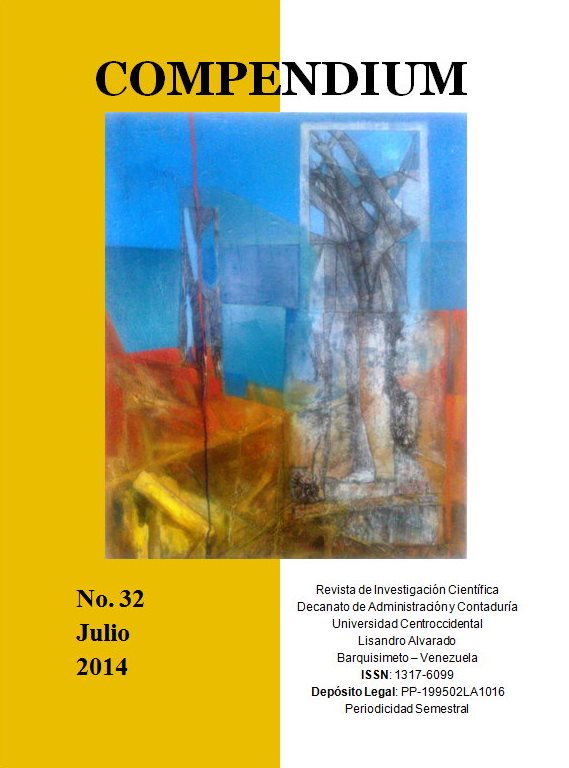Critical success factors in the management of the teams of scientific research in a university
Keywords:
teamwork, research teams, knowledge production, universitiesAbstract
Current society requires knowledge to function properly. Scientific knowledge is generated by the scientific community, which is generally organized in research teams that develop a
management to achieve its objectives. The purpose of this study is to determine the Critical Success Factors (CSFs) in the Management of Scientific Research Teams at the Universidad Centroccidental Lisandro Alvarado (UCLA), Venezuela. The methodology was based on the qualitative paradigm and the phenomenological approach for understanding the reality experienced by coordinators regarding the management of scientific research teams. We worked with a purposive sample consisting of seven (7) Coordinating
Scientific Research Equipments and three (3) Research Unit Coordinators. As a technique of data collection, two (2) selfadministered structured surveys with open questions, in which coordinators expressed freely their experiences, were used. As a result the following success factors emerged in the management of scientific research teams: administrative functions, teamwork, training, resources, lines of research and dissemination. Additionally it is found that the relationship between scientific research teams and their units
is characterized by a dependence-based management, information and support. The strengthening this relationship would encourage the production of knowledge in the university as a whole.
Downloads
References
ARJONA, MIGUEL (1999). Dirección estratégica: un enfoque práctico: principios y aplicaciones de la gestión del rendimiento. 1ra Edición. Ediciones Díaz de Santos. España.
AYUSTE, ANA, BEGOÑA GROS y SOFÍA VALDIVIELSO (2012). Sociedad del Conocimiento. Perspectiva Pedagógica. Universidad Nacional de Educación a Distancia. España.
COMISIÓN VENEZOLANA DE NORMAS INDUSTRIALES - COVENIN (2003). COVENIN-ISO 10006-2003. Norma Venezolana Sistema de Gestión de la Calidad– Directrices para la Gestión de la
Calidad de los Proyectos. FONDONORMA. Venezuela.
CLAUSSE, ALEJANDRO (2012). Organización de Equipos de Trabajo de Investigación y Desarrollo. Universidad Nacional del Centro. Argentina. Fuente: www. exa.unicen.edu.ar (Consultado el 15-05-14).
CUESTAS, EDUARDO (2011). Estrategias para la formación y desarrollo de equipos de investigación exitosos. Revista Archivos Argentinos de Pediatría. Vol. 109. No.2. pp. 100-102.
FÁBREGAS ROSA; ANDREAU GRAU y SONIA RUIZ (2012). Desarrollo de un nuevo sistema de gestión de la investigación universitaria. Revista Española de Documentación Científica. Vol. 35. No 3. pp. 481-488.
FRANCÉS, ANTONIO (2006). Estrategia y Planes para la Empresa con el Cuadro de Mando Integral. PEARSON-PrenticeHall. México.
HERNÁNDEZ ROBERTO; CARLOS FERNÁNDEZ y PILAR BAPTISTA (2003). Metodología de la Investigación. Cuarta Edición. McGraw-Hill. México.
MARTÍNEZ, MIGUELEZ (2004). Ciencia y Arte en la Metodología Cualitativa. Trillas. México.
MICHELLE BENNETT; HOWARD GADLIN y SAMANTHA LEVINE-FINLEY (2010). Collaboration and Team Science: A Field Guide. National Institutes of Health. Fuente: teamscience.nih.
gov. (Consultado el 10-06-14).
MIRANDA, FRANCISCO; ANTONIO CHAMORRO y SERGIO RUBIO (2007). Introducción a la Gestión de la Calidad. DELTA Publicaciones. España.
OFFICE OF GOVERMENT COMMERCE - OGC (2009). Estrategia de Servicio. The Stationery Office. Reino Unido.
PUERTA, MARÍA (2008). La Gerencia de Instituciones de Investigación Científico-Tecnológicas. Revista FACES. Vol. 19. No. 2. pp. 215-243. Fuente: servicio.bc.uc. edu.ve (Consultado el 12-03-13).
RICO, RAMÓN; CARLOS ALCOVER y CARMEN TABERNERO (2010). Efectividad de los equipos de trabajo, una revisión de la última década de investigación (1999- 2009). Revista de Psicología del Trabajo y de las Organizaciones. Vol. 26. No. 1. pp. 47-71.
ROCHA, JESÚS; MARÍA MARTÍN y JESÚS SEBASTIÁN (2008). Estructura y dinámica de los grupos de investigación. Revista ARBOR Ciencia, Pensamiento y Cultura. No. 732. pp. 743-757. Fuente: arbor. revistas.csic.es (Consultado el 15-10-14).
SUÁREZ, WENDOLIN; LILIA PEREIRA y MORELA PEREIRA (2012). Gestión de la investigación en la Universidad del Zulia Período: 1996-2004. Actualidad Contable FACES. Año 13. No 20.
pp. 136-148.
SANDÍN, PAZ (2003). Investigación Cualitativa en Educación. Fundamentos y Tradiciones. McGraw-Hill Interamericana. España.
SUMMERS, DONNA (2006). Administración de la Calidad. Pearson Education. México.
UNIVERSIDAD CENTROCCIDENTAL LISANDRO ALVARADO - UCLA (2004). Normas para la Creación, Fortalecimiento y Evaluación de Unidades de Investigación de la UCLA. Barquisimeto.
Venezuela. Fuente: www.ucla.edu. ve (Consultado el 30-11-14).
UNIVERSIDAD CENTROCCIDENTAL LISANDRO ALVARADO -UCLA (2006). Reglamento del Consejo de Desarrollo, Científico, Humanístico y Tecnológico (CDCHT) de la Dirección de Investigación de la UCLA. Barquisimeto. Venezuela. Fuente: www.ucla.edu. ve (Consultado el 30-11-14).




